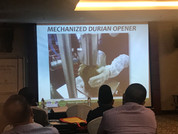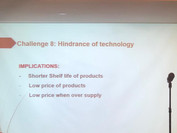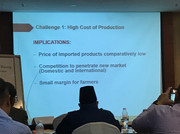5th November 2019 - Kuala Lumpur.
The agriculture supply chain and management course attracted many people who are interested in exporting agricultural products. There were 5 lecturers invited to the course to present the 5 main aspects of international agricultural export trade. The major problem of farmers in Malaysia is the fact that they don’t earn enough income on average, even though they are working extremely hard every day to grow the crops that should be enough to sustain them. This has indirectly caused Malaysia’s crops to lack international competitiveness. One major drawback is the price higher than imported agricultural products. Moreover, the exchange rate has also proven to be a difficulty to the competitiveness of our agricultural products in the international market.
Next up is the Malaysian Good Agricultural Practice (MyGAP), which everyone is interested in learning more about. The lecturer mentioned that the MyGAP’s standard application process must take 3 to 6 months to complete. At present, the biggest challenge facing MyGAP is insufficient publicity, and as a result many people still do not understand the benefits of MyGAP. Therefore, relevant units are thinking about ways to promote MyGAP to the international level.
Getting MyGAP is just like getting ASEANGAP; the crops holding this certificate can be exported to foreign countries without interruption. In addition to promoting MyGAP, relevant units are also working hard to promote GlobalGAP, hoping to enter the European market in order to let more people learn more about this international certification. Therefore, to help introduce this certification to the world, they will need to promote it domestically, but more so on the international market, and only then will the certification help farmers export their goods internationally.
The lecturer also emphasised the benefits of MyGAP: not only does it certifies food safety and quality of exports, but also ensures that your fruits and vegetables are not contaminated, increasing consumer confidence. That’s because the authorities need to learn about every material used in the planting process, as the audit is very strict about it.
It is also the government’s hope to effectively control the crop plating process through MyGAP, and also learn about whether farmers use excessive pesticides in the process. After applying for MyGAP certification, government officials will send staff each year to ensure that it is operating in accordance with specifications.
In addition to the certification part, the lecturer also specifically mentioned the importance of the tracking system. Once you discover that your fruits or vegetables are rotten or any other problems, you can trace its source through the tracking system. It can instantly find which part of the process went wrong and deal with it immediately.
Different vegetables and fruits must have established product packaging, and they must meet the standards in order for them to be exported abroad. The course also mentions the method to apply for exporting your crops and even the amount of time needed for the application, and it varies between every fruit. In addition to applying for MyGAP, you will also need to apply for MPPO before your crops can be exported. The purpose of this is for inspection by personnel in the local department of the importing country. Both certificates must be handed in for the process of preparation to be completed.
2019年11月5日-吉隆坡讯。
由马来西亚国际贸易及工业部及工业研究及规格局旗下STS机构联合举办的蔬果供应链及管理课程吸引了许多对农产品出口感兴趣的人士参加。这次从产学单位邀请来的五位讲师,分别讲述了蔬果国际出口贸易的主要五个面向。其中就提到我国农民所面对的威胁。为何会出现就算种植出我们每天都需要摄取的粮食,仍然有赚不到钱的情况。原来是因为很多时候进口产品比自己生产的还多,所以产量不足,导致供不应求。这也间接造成我国蔬果产品在国际上缺乏竞争力,不只价格比国外农产品高,兑换率问题也是导致成本增加的因素之一。
再来是大家都很想进一步了解的大马良好农业规范认证(MyGAP)。课程中讲师提到MyGAP的标准申请程序,必须耗时3到6个月才可以完成。而目前MyGAP面对最大的挑战是宣传不足,以至于许多人仍不了解MyGAP的好处,所以相关单位在思考以产学合作的方式,将MyGAP这项受到国际认可的认证推广出去。
而且拿到MyGAP犹如拿到ASEANGAP,持有这张认证的蔬果若要出口到国外将通畅无阻。除了推广MyGAP,目前相关单位也努力宣传GlobalGAP,希望打入欧洲市场让更多人知道这个国际认证。所以针对这些进出口认证,不只要在国内宣传,在国际间也要做出更多努力,才算是真正的帮助我国农民打开国际通道。
讲师也特别强调MyGAP的好处,不只是经过认证的食品安全、出口有品质,而且也标榜蔬果不受污染,增加消费者购买的信心。因为MyGAP在审核时相当严格,不只注重蔬果的种植环境,当局还要掌握种植过程中所施放的所有材料,所以审核机制是非常严格的。
这也是政府希望透过MyGAP来进行蔬果种植过程的有效控管,进而掌握种植者是否使用超标农药。不仅如此,当申请到MyGAP认证之后,政府官员还会每年派员检视,确保一切仍是按照规范作业。
除了认证部分,讲师也特别提出追踪系统的重要性。一旦有蔬果发生食安问题,就可以透过追踪系统追根朔源。并从种植、生产、包装到出口,这些环环相扣的作业过程中,找到问题所在并即时处理。
至于不同的蔬果都要符合标准的产品包装才能输出国外。讲师也提到每一种水果申请出口的方法及程序都不太一样,以及大致的作业时间等。当蔬果要出口之前,除了要申请MyGAP也不能忘了要办妥MPPO,这是给进口国当地部门的人员来做检验,必须要两张认证在手,才算是完成准备出口的工作。

























































































































































































Comments